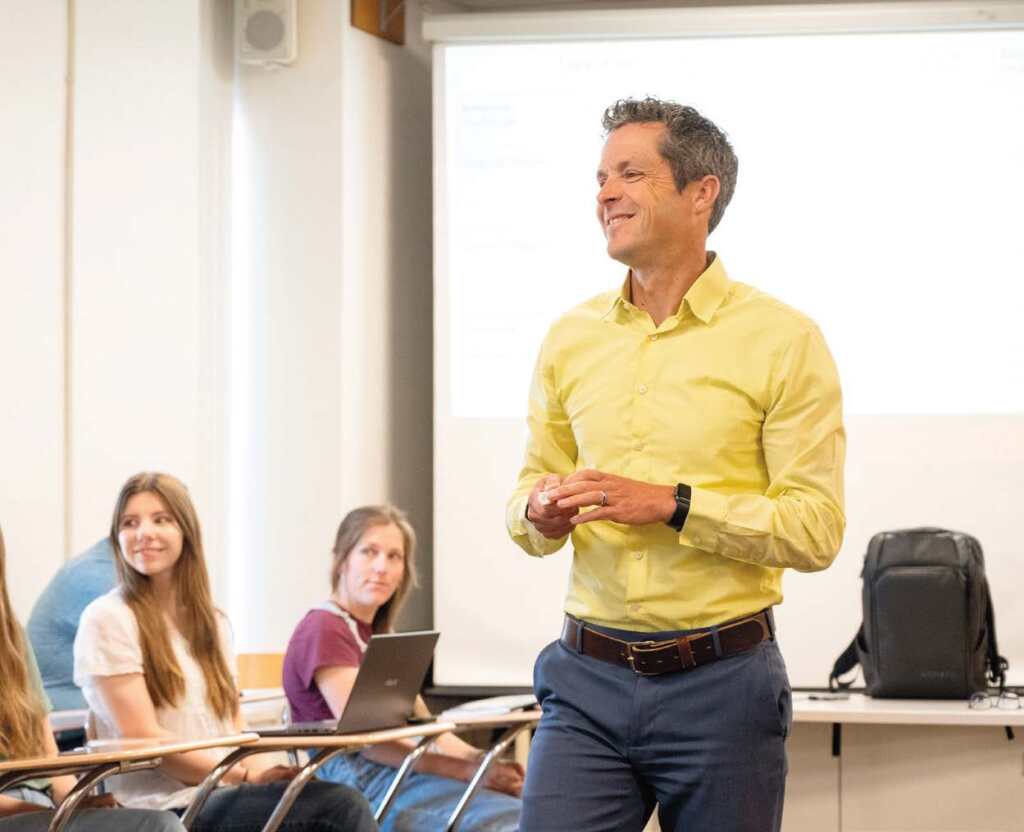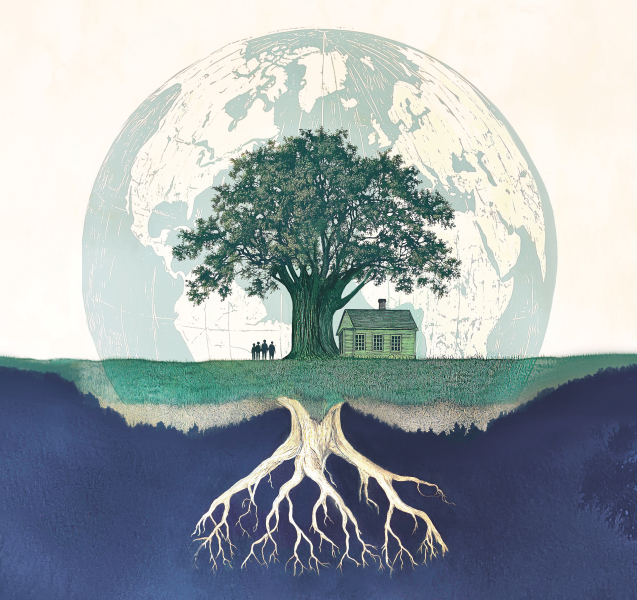For over 10 years, BYU-Idaho faculty member Tim Rarick has taken groups of family policy students to the United Nations to advocate for marriage and family on the global stage.
“The strength of any nation is rooted within the walls of its homes.”
In September 1995, when President Gordon B. Hinckley presented “The Family: A Proclamation to the World” at a General Women’s Conference for The Church of Jesus Christ of Latter-day Saints, he stated, “The strength of any nation is rooted within the walls of its homes.”[1]
The proclamation, which will celebrate its 30th anniversary this year, outlines church doctrine regarding the divine order of the family and warns against things harmful to it, and its teachings are more critical now than ever.
“The Church exists to exalt the family. And the family is the fundamental unit of the Church,”[2] President Russell M. Nelson said in 2001. The family is the fundamental unit of not only the Church, but of society as well.
“The Family: A Proclamation to the World” states, “We call upon responsible citizens and officers of government everywhere to promote those measures designed to maintain and strengthen the family as the fundamental unit of society.”[3] This call or charge is extended not only to those with large circles of influence, but also to responsible citizens like you and me.
The most important and significant ways to maintain and strengthen the family must be made by spouses, parents, teachers, brothers, sisters, and all who have the power to make a stand in their own homes and communities. Sometimes, however, the chance to advocate for the family in a larger setting comes along.
“There is opposition and it is strong, but there is also still goodness. The Lord wants us to pursue that goodness and cling to it because there is hope.”
After taking a Child and Family Advocacy class at BYU-Idaho taught by Tim Rarick, Marriage and Family Studies students Erica Battezzato, Marinda Loertscher, Alexa Franco, Kinsley Price, and Shelby Allen applied for a unique opportunity to attend the United Nations (UN) as advocates for children and families. After being selected, these students were required to undergo a three-month-long training process in partnership with United Families International to prepare for their important family advocacy work at the UN.
“During the training process we were given materials to read to help us understand the inner workings of the United Nations as well as what our role would be when we went,” said Shelby Allen. “We also read a book about the experience of previous advocates who had gone to the United Nations and how they were able to stand for principles found in the family proclamation and share the light of Christ in a secular setting.”
Though the process was lengthy and took a great deal of work, the students persevered and were well-prepared when the time came. Their education at BYU-Idaho was a large part of their success at the UN.
At BYU-Idaho, “[the] mission is to develop disciples of Jesus Christ who are leaders in their homes, the Church, and their communities.”[4] BYU-Idaho combines both spiritual and secular principles in its teaching, allowing students the chance to develop practical skills while also allowing them to grow spiritually.
These five students—along with the others who were selected—had the opportunity to practice those unique skills and principles they learned while acting as advocates at the UN.
“I learned how to respect opinions and realize these people are … trying to share what they believe, and they’re trying to fight for that, and I’m doing the same thing. So I need to respect them, but I was also trying to help them understand that there is another option and there’s another way of thinking,” Erica Battezzato said.
This principle was one that Erica Battezzato, along with several of her classmates, came to deeply understand through their experience at the UN. Everyone who attends the UN has a different belief system and different values, and those beliefs and values can often come into conflict. This is also generally true of our world today.
Both the Savior and His prophets have warned us against contending with one another. In 3 Nephi 11:29–30, we read the Savior’s words: “He that hath the spirit of contention is not of me, but is of the devil … and he stirreth up the hearts of men to contend with anger, one with another. Behold, this is not my doctrine, to stir up the hearts of men with anger, one against another; but this is my doctrine, that such things should be done away.”

As humans, we are prone to pride, which often means we grow defensive and hostile when fighting for our beliefs. It can make us forget that we’re all human and, most importantly, that we are all children of God with agency. This prideful mindset leads to contention, which can be both physically and spiritually destructive, just as the Savior warned. Thankfully, there is a way to keep the contention to a minimum as we stand for truth.
“I went in expecting to find all the opposing voices … and I was pleasantly surprised to find that we did not stand alone in our family advocacy efforts,” said Kinsley Price. “I could have chosen to let the oftentimes louder opposing voices become my focus, neglecting to see the good, but I found that when I sought out the good, I found it. … There is opposition and it is strong, but there is also still goodness. The Lord wants us to pursue that goodness and cling to it because there is hope.”
When we are willing to set aside our pride and listen to one another, the similarities to be found can be surprising. Even though many of the groups at the UN differed greatly, there was goodness there and opportunities for robust discussion when Price and her classmates looked for them.
“There was a lot of ideology and things that were talked about at the UN that I didn’t agree with … but it’s important to have a discussion about all of it, or else we’re missing the truth in the middle. Maybe I don't see all the truth from my perspective in my experiences, but … they don’t have all the truth in their pieces either,” Marinda Loertscher said. “The truth comes out in the discussing and in the working together to find a middle ground.”
When we come face to face with people who believe differently, the thing we fear most may be compromising our beliefs or values. We might be afraid that trying to find a common solution or “agreeing” with the other side means we’ll have to abandon what we know to be right and true. But we can disagree and stand for truth without creating contention.
President Russell M. Nelson testified of three important principles for disagreeing well: “Show compassionate concern for others,” “bridle the passion to speak or write contentiously for personal gain or glory,” and “in humble submissiveness, truly [love] God.”[5] When we do these things, we can be true disciples of the Lord Jesus Christ regardless of how others see us.
Christ spent time with people He disagreed with quite often. He was not, however, required to compromise or abandon what He believed in and knew to be right. Instead, He listened and reached out with love to those around Him. Although there were many occasions when He needed to be bold, He disagreed with a heart of peace. He held His tongue when necessary. He never spoke for personal gain or glory, but instead gave all the glory to His Father in Heaven. He loved His Father and submitted to His will.
The students who attended the UN embraced the principles of Christlike disagreement and were able to love those who believed differently. Instead of contending, they stood up peacefully and advocated for what they believed. They were able to stay true to what they knew to be true while building bridges with those who disagreed.
“This experience has helped me to realize that I can be a disciple of Jesus Christ, even in my workforce and in my personal life.”
Learning and practicing these principles at the UN helped reinforce the love that each of these students held for their Heavenly Father. It was, after all, His love and His persuasion that drove the students to attend.
“When I heard about it, I thought it was a wonderful opportunity for me to defend the family … and to put into practice what I had learned in class,” said Alexa Franco. “But I would say my inspiration really was the Lord. The Lord inspired me to do this.”
While the students put into practice the knowledge and skills they had learned in the Marriage and Family Studies program at BYU-Idaho, they also deepened their trust in God and confidence to stand as His witness.
“It didn’t matter so much if I was a perfect speaker. It didn’t matter if I always had peace in my heart. What mattered more was … Am I willing to let go of myself and allow God to work His miracles through my efforts?” Marinda Loertscher said. “This experience has helped me to realize that I can be a disciple of Jesus Christ, even in my workforce and in my personal life.”
God has always been able to use imperfect people to work His mighty miracles. Alma reminds us in Alma 37:6–7 that “by small and simple things are great things brought to pass … And the Lord God doth work by means to bring about his great and eternal purposes.”
These students were capable and qualified for this work through their secular studies, but what made the experience at the UN truly impactful was their willingness to set aside any concern about their personal weaknesses and allow God to lead them. They were able to communicate the truths contained in “The Family: A Proclamation to the World” with social science and secular language in a way that the others in attendance could understand. They were able to make a difference thanks to their humility and their dedication to the work.
The UN experience reinforces the importance and validity of the charge given in “The Family: A Proclamation to the World.” The most important advocates for the family reside in homes and small communities, and our small and simple efforts to stand for truth with Christlike love and the peace of God will serve to strengthen the family.
Our contributions are, perhaps, small, upon first impression. But mighty oaks grow from little acorns. Every parent who teaches their children of the sacredness of the family, every person who brings names to the temple, every family that has dinner together, every manager who supports their employees’ work-life balance makes a greater impact than they could know. If you and I can engage ourselves in small and simple things such as these, the future of the family and the world is more hopeful than we can now imagine.
Notes
[1] Gordon B. Hinckley, "Stand Strong Against the Wiles of the World," Ensign, November 1995.
[2] Russell M. Nelson, "Set in Order Thy House," Ensign, November 2001.
[3] "The Family: A Proclamation to the Family," Gospel Library.
[4] "BYU-Idaho Mission Statement," BYU-Idaho, byui.edu/about/mission.
[5] Russell M. Nelson, "The Canker of Contention," Ensign, May 1989.
